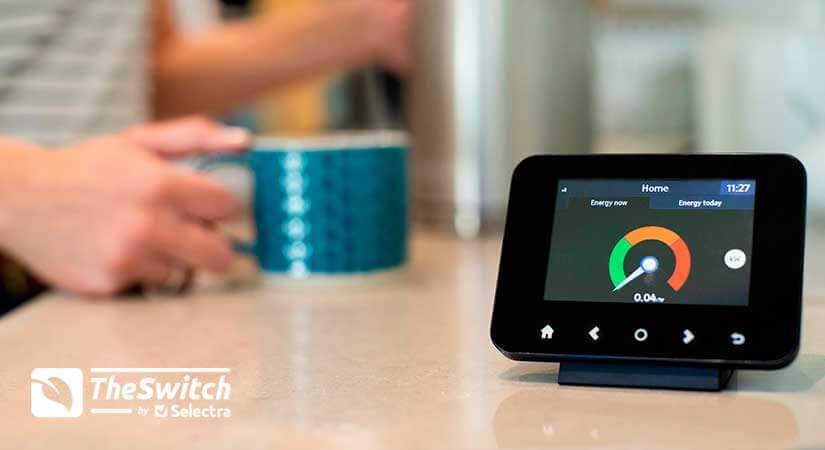Pros and Cons of Smart Meters: A Guide

Smart meters, just like ordinary energy meters, measure how much gas and electricity you use. The only difference is that smart meters use more advanced technology to give readings almost in real-time and with increased accuracy. Why, then, are so many under the impression that they mean the end of the world? If you want the facts, keep reading.
If nothing else, we’re all for smart meters because they could save you money and help the environment all at once. So why is there a movement to “say no to smart meters”? More on this further down. Let’s start with the basics.
How do smart meters work?
Smart meters work by connecting your home to a secure, nationwide smart network, which is similar to a mobile phone network, run by the Data and Communications Company (DCC). The DCC sends data relating to your gas and electricity usage from your smart meter to your provider and the meter displays this data almost in real time on its In-Home Display (IHD) - a small digital screen to replace the mechanical dials used in traditional meters.
What does a smart meter IHD show?Your IHD will show you your energy usage both in kWh (kilowatt hours) and in pounds and pence. This gives you a clear picture of your usage in terms that you can understand and that are useful to you.

Smart meters work differently depending on whether they’re measuring electricity or gas. For electricity, the meter is connected to the mains and is able to tell you how much you’re using as you use it. For gas, it uses a battery-powered meter which is inactive most of the time, but activates every half an hour to send a reading to the IHD and your provider.
The benefits of this technology will be immediately evident to many readers, not least those who have been stung by unexpectedly high bills in the past from not knowing what their energy spending is going on. So why have we been hearing so many bad things about them?
In the next section, we’ll be taking you through the pros and cons of smart meters to give you a better understanding of the situation.
Pros and cons of smart meters
We’re letting you know up front that we’re fans of smart meters. Their benefits seem to far outweigh their drawbacks, and our summary of the pros and cons of smart meters is bound to reflect this. Let’s get down to it:
Are smart meters good? The advantages
Here are just a few of the advantages that come along with getting a smart meter installed:
- They help you better understand your energy usage. With a smart meter, energy spending no longer has to be a mystery until your meter reading is sent at the end of the month. You can see how much every spin cycle and storage heater charge is costing you as you spend it, and make decisions on whether it’s worth it on the fly.
- They can help you change your habits to save you money. A better understanding of your energy spending can help you take steps to cut it. Notice that your bills shoot up when you use certain appliances? Perhaps you could use them more sparingly or invest in newer, more energy-efficient models. For more tips on saving energy, see our guide.
- They’re better for the environment. Being able to make changes to bring down your energy bills is not only good for your bank balance but also for the environment. Using less energy means less CO2 emissions from energy production and less reliance on fossil fuels, meaning a higher proportion of our energy coming from renewable sources like solar and wind energy, hydroelectric power, and biogeneration.
- They do away with estimated bills. With a smart meter, you’ll no longer be over or undercharged on your direct debit - your meter sends accurate readings directly to your provider, meaning you’ll only pay for exactly what you use. This means no building up credit unnecessarily which is impossible to get back when you leave and no racking up a huge debt after months of undercharging.
- They do away with monthly meter readings. Before, if you wanted an accurate rather than estimated bill from your provider, you had to send them a reading every month from your mechanical meter. Your provider receiving accurate readings automatically from your smart meter means you can get accurate bills without going through the hassle of taking meter readings yourself.
- They’re free to install. Providers are obligated to offer smart meters and we do not know of any that will charge you for installation. You just have to wait until your provider’s rollout reaches your area to have one installed, which has probably already happened unless you live in a rural area.
- Access to better energy deals. In the future, the cheapest energy tariffs will only be available to those with smart meters. There are already plenty of deals exclusive to those with smart meters, and exclusive tariffs will only get more common as providers look to get in line with government policy and incentivise the new technology.
- Makes specialist tariffs easier to manage. Customers on prepayment or Economy 7 tariffs, for example, will find it easier to get the most out of their tariffs with a smart meter. The ability to see their usage and when they’re paying the cheaper rate in real time will make it easier for them to save.
Smart meters: problems & disadvantages
The downside of smart meters can be summed up in the following points:

- Saving money requires proactive use. While smart meters do make saving money a lot easier for customers, these savings are not made automatically. Your energy use will not monitor itself and changes in habits that could save you money do not make themselves. It could become a bit of a compulsion for some users to keep checking obsessively and may make you wish you could go back to being kept in the dark.
- Smart meters are not infallible. Like all technology, things can go wrong with your smart meter. Usually, however, a technical fault will just mean that your meter reverts to its old functionality and stops giving real-time updates. You would have to go back to providing meter readings until you got it fixed, but there would be no disastrous consequences.
- Concerns over user privacy. Some people worry that information relating to their energy usage could be passed on third parties. There are, however, already laws prohibiting energy companies from sharing this information without customers’ permission, and smart meters seem to represent no more threat to user privacy than other smart devices.
- They need to be replaced more regularly than older meters. Smart meters are said to need replacing once every ten years. For those who have had the same mechanical meter for decades with no issue, this may sound like a hassle you could live without. It’s certainly more frequent than we’re used to with our older meters, but given all the advantages that smart meters bring, we think we can live with it.
- They could lose smart functionality if you switch. Many of the smart meters that have already been installed are first-generation (SMETS1) smart meters, which got a bad rap for their tendency to go “dumb” when users’ energy supply switched from the provider that installed them to a new provider. Second-generation (SMETS2) smart meters do not have this problem and SMETS1 will eventually be updated to work no matter your supplier, so it’s soon to be a non-issue, but many users will continue to associate the technology with this basic fault that early models experienced.
SMETS1 vs. SMETS2
If you’re reading about smart meters for the first time, you might be slightly confused by SMETS1 and SMETS2. Put simply, SMETS1 was the first generation of smart meters and SMETS2 is the second, most recent generation of the technology.
SMETS1, as we mentioned above, had the problem that once you switched away from the provider that installed the meter, it lost its smart functionality and you went back to having an older meter. This made choosing an energy supplier quite the commitment and put quite a lot of people off accepting a smart meter installation.
SMETS2 does not have the above fault. In fact, having a SMETS2 meter makes switching providers much easier. The national communications network linking SMETS2 meters makes the process immediate and means that you don’t have to do anything and no engineer visit is required to put the switch into effect.
SMETS1 meters will eventually be updated (remotely) as well so that they don’t lose functionality when you switch, so soon there will be no reason to avoid making the switch because of your smart meter.
Smart meter FAQs
In this section, we’ll take you through some common questions posed by users about smart meters, hopefully putting to bed any doubts you may have about the technology:
Are smart meters compulsory?
No, smart meters are not compulsory from a consumer standpoint. The government is, however, determined to make sure they’re available to everyone across the UK, and to this end your provider is obliged to offer you one as and when its smart meter rollout reaches your part of the country.
You are, for now, under no obligation to accept one if you don’t want one and your provider cannot force you to get one installed unless you agree to a tariff which requires you to get one installed.
Are smart meters safe?
Yes, smart meters are safe. It has been speculated that radiofrequency fields produced by smart meters, which are the same as those produced by mobile phones, present a risk to public health. There is little evidence of a risk either from mobile phones or smart meters - exposure to a very high field intensity, which is found only in industrial facilities, is said by the WHO to lead to an increase in body temperature, but you needn’t worry about either your mobile or your smart meter causing this.
Can smart meters be hacked?
Smart meters, like many smart devices, can technically be hacked. There seems to be very little risk of this, however, and few instances of smart meter hacking have been reported since the technology began to be rolled out.
One instance of smart meters being hacked in Puerto Rico in 2009, where users were subject to power theft and fraudulent bills, has been cited by sceptics ever since. In the last decade, however, no similar instances seem to have been reported globally relating to smart meters. A lot of care is taken by regulators and government to ensure that the digital infrastructure used by smart meters is secure and safe for use by consumers.
Do smart meters need WiFi?
No, smart meters do not need WiFi. They use their own wireless network (the one run by the DCC mentioned above) to communicate with the IHD (in-home display) which is only used by smart meters. Your home doesn’t even need to be connected to the internet in order to have a smart meter installed.
What happens if I unplug my smart meter?
Smart meter IHDs are equipped with an internal battery which will eventually run out of charge. Bulb, for example, says that its smart meter IHDs will last for about an hour and a half on battery and then will need to be recharged if you want to see real-time updates. The screen itself is not the meter, however, so your supply won’t be affected if the screen goes off.
If, however, your screen goes off and you can’t get it back on even after charging, you should contact your supplier.
